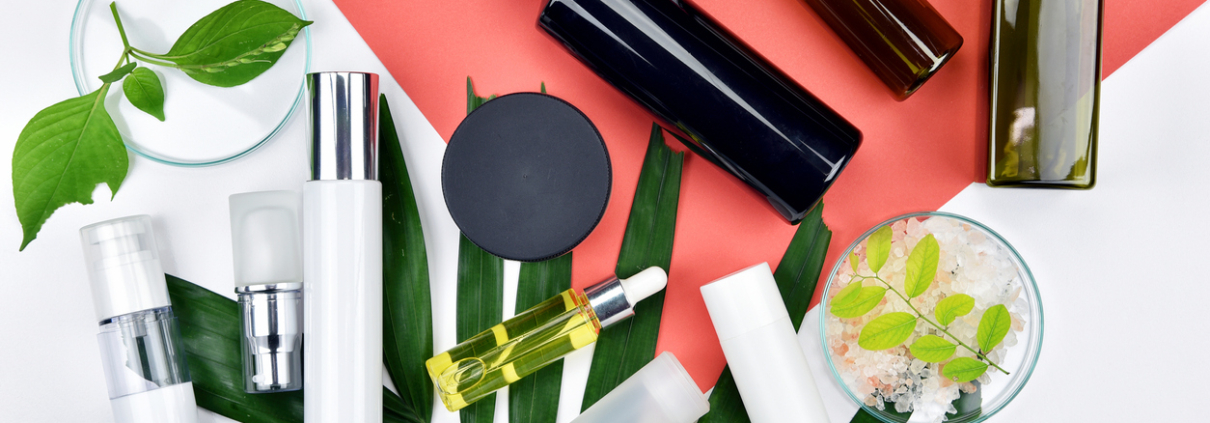Toxins in Your Beauty Products & Your Fertility

When women or couples experience challenges with fertility, they look for possible causes. While there may be medical reasons for a woman’s difficulties in getting pregnant, research has shown other factors such as stress and environmental toxins may also play a role.
Many men and women encounter toxins in their personal care routines every day, often unaware of the impact these could have on their fertility. Research has identified four primary areas of fertility that are impacted by toxins in personal care products. Learn more about these effects below.
Endocrine Disruption and Reproductive Harm
The endocrine system is the body’s chemical messenger system. It is responsible for transmitting information that makes hormones. These hormones control everything from moods, growth, development, metabolism, and reproduction.
Many cosmetics and personal care products contain synthetic byproducts such as parabens, phthalates, glycol ethers, fragrances, cyclosiloxanes, and bisphenol A (BPA). These can act as endocrine disruptors causing interference with hormone signaling, production, and excretion.
What’s In Your Personal Care Products?
An article by the Environmental Working Group cited women use an average of 12 products containing 168 unique ingredients every day. Men use about six products daily with 85 unique ingredients. Their study shows that some of the chemicals in personal care and cosmetic products have been linked to health problems.
The most common effects of exposure to endocrine disruptors appear to be reproductive and developmental effects. These include ovulation disorders, fibroids, disruption of thyroid function, male sexual dysfunction, low sperm count, possible link to cancer, and low birth weight in babies.
Common Toxins In Personal Care Products
- Parabens are perhaps one of the most common toxins added to personal care products as a preservative. They can act as estrogens and disrupt hormone signaling. They have been linked to potential fertility issues in men and women, congenital disabilities, a link to breast cancer, as well as a link to more aggressive tumor growth and the formation of malignant cancers. Many moisturizers, facial cleansers, sunscreens, deodorants, shaving gels, kinds of toothpaste, cosmetics, and other personal care products contain parabens.
- Phthalates are commonly found in some cosmetic fragrance mixtures, nail polishes, hairsprays, after-shaves, deodorants, and other personal care products like shampoos, conditioners, and moisturizers. Phthalates have been found to cause reproductive abnormalities such as reduced testosterone and sperm quality in men and early puberty in girls.
- Formaldehyde is a preservative commonly added to products to add to shelf life and prevent mold and bacteria growth. Nearly one in five cosmetic products contains a substance that generates formaldehyde, a known carcinogen. These products include shampoos, conditioners, bubble baths, and other personal care products, including those marketed for children. Formaldehyde and formaldehyde like chemicals are also found in hair straighteners and “smoothing” creams marketing for the BIPOC community. Exposure to formaldehyde can include risks of reduced fertility and increased risk to the fetus.
- Triclosan and triclocarban are chemicals found in a variety of products. Triclosan was banned in antibacterial soaps in 2017. However, they are still found in some dish soaps, personal care products, and toothpaste. It is used in a variety of products but won’t be on the label. To avoid triclosan do not buy products listed as antibacterial. Although this might seem tempting and should make things cleaner, its all harm and no good in this situation. Even at low levels, these chemicals have been shown to interfere with thyroid signaling and male and female sex hormone signaling leading to reproductive abnormalities.
Unfortunately, the cosmetic industry in the United States is largely self-regulated at this time, and there is not any restriction on the use of harmful chemicals in personal care products.. In February 2020, the California Assembly reintroduced the Toxic-Free Chemicals bill under A.B. 2762 which proposes banning 12 toxic ingredients, such as mercury and formaldehyde, from the beauty and personal care products sold in California. This is the third time such a bill has been proposed, earlier iterations of the bill being blocked in April 2019 and failing in January 2020. You can read about their efforts here.
Toxins such as those listed are readily absorbed into your skin and metabolized by your body. Because you use these products daily, the exposure to such toxins compounds over time creating a greater effect of harm on your body.
Defend yourself against toxins
Your best defense is taking the time to educate yourself about the products you use and making changes to clean products. Although this article specifically addressed personal care products, environmental toxins are all around us. To learn more and find out how you can reduce your exposure you can find additional references and articles here on our website.
To start educating yourself about toxins in your personal care products and other purchases you make, I suggest the Environmental Working Group’s website www.ewg.org. EWG is a non-profit, non-partisan organization dedicated to protecting human health and the environment. They also have a database created specifically for products. Some are EWG Verified, meaning the products are free from harmful chemicals, provide full transparency in labeling, and follow good manufacturing practices. Other products rated on a scale from 1 to 10 indicating least to most harmful in terms of your health. You can enter your current products in the search in the Skin Deep Database and see how they measure up.
Reducing or eliminating toxins in personal care products is one facet of integrative medicine we suggest to women and couples we work with at our clinic. If you are interested in a consultation to see if integrative techniques or IVF can further support your fertility treatment journey, contact us to set up a consult with Dr. Shala Salem.




